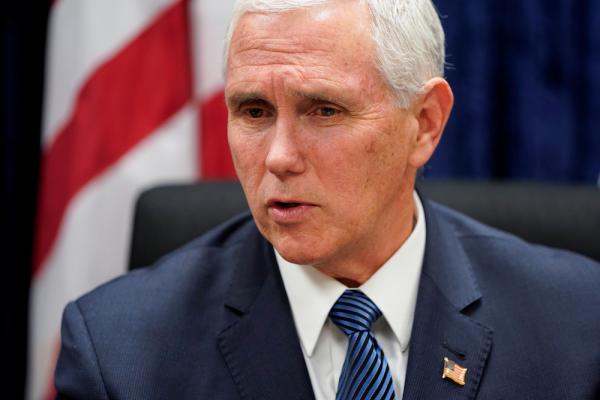Early Thursday morning, Taylor University announced its choice of U.S. Vice President Mike Pence as its commencement speaker. As a TU alum, who regularly spends time on the campus talking to faculty and students, I was completely taken aback by this announcement. It wasn’t just me who was surprised. The majority of the faculty expressed their opposition to the choice of Pence in a faculty meeting following this announcement. Many students also are shocked by the selection, some of whom have signed a petition denouncing the selection of Pence.
Taylor president Paul Lowell Haines extended the invitation to Pence, noting: “Mr. Pence has been a good friend to the University over many years, and is a Christian brother whose life and values have exemplified what we strive to instill in our graduates.”
Pence has unequivocally identified himself as an evangelical Christian, and I will not presume to dispute these claims. I do, however, think we need critical reflection on Haines’s claim that Pence’s values are representative of Taylor University or of evangelicalism in general. We need to ask ourselves the question: To what sort of gospel do Mike Pence’s political values bear witness, and is this the sort of gospel that we want to proclaim or to send out our young people out into the word with?
As a long-time Indiana resident, and an observer of Mike Pence’s political career for over a decade, one of the greatest flaws of his political career is his ambition. At each stage of his career, he has demonstrated that he has his eyes set on moving up the political chain. This ambition has been particularly problematic during his vice presidency, because he has said little or nothing that disputes the character and political vision of Donald Trump. So, as far as we know, Mike Pence’s values are compatible with those of Donald Trump, whose false statements are off-the-charts in comparison to any politician in recent memory, who casually boasts of grabbing women’s genitalia, who has a long and well-documented history of racist behavior, who keeps immigrant children fenced off like animals in a zoo, and so on.
Are these the sort of evangelical values that we want to celebrate and lift up as representing our evangelical institutions? If so, count me out. But I’m not so quick to abandon the evangelical label. I think evangelicals have other political values and traditions that are actually good news to our neighbors in American society in 2019. What if, for instance, evangelical politics was renowned for championing civil conversation in our polarized society? This sort of conversational politics might be shaped around traditional evangelical virtues such as transparency, hospitality, and empathy.
In contrast to the lies and evasions of the Trump/Pence administration, we might excel in our transparency – speaking plainly, honestly, and without boasting. Transparency doesn’t necessarily mean parading our worst mistakes through the public square, but it does mean that when we are confronted with mistakes of our past, we don’t try to cover them up or justify them, but own the mistakes in a spirit of contrition.
In contrast to the hostility of the Trump/Pence administration toward its political opponents, evangelicals might excel in our hospitality, going out of our way to create spaces in which conversation and collaboration can unfold. True hospitality is not driven by fear, but rather courageously steps forward to engage the stranger, seeking to build bridges and not walls.
In contrast to the dismissiveness and prejudice of the Trump/Pence administration, evangelicals might excel in our empathy, taking seriously the wisdom of the apostle James, and being “quick to listen, slow to speak, and slow to become angry” (James 1:19). Our politics would be radically different if we tried to listen carefully to those whose convictions differ from our own and tried to understand them well.
An evangelical politics of conversation, as I have sketched it here, not only reflects the character and mission of Jesus, it might actually be received as good news by a society wracked by division. A growing number of churches across North America are leaning into this very different sort of politics, and are learning to cultivate habits of conversation among their members and their neighbors. (I tell some of their stories in my book How the Body of Christ Talks).
Much has been written about the widespread evangelical support for the Trump/Pence ticket in 2016 (including historian John Fea’s superb book, Believe Me: The Evangelical Road to Donald Trump), and evangelicals likely had a range of motives for casting their lot with Trump and Pence. The scene is clearer now in 2019. After two full years in office, the Trump administration is no longer an unknown entity. Its values and character have been made known, and they do not reflect the best virtues of evangelicalism.
Taylor University, and other evangelical institutions, should no longer give credence to this administration as representative of evangelicalism. We need to give up the lust for power that struggles to maintain a grip on the fading wisps of Christendom and that has bound us up with all the sorts of ungodly values that this administration represents. Instead, we need a new brand of evangelical politics, one that is increasingly marked by its habits of conversation, and the virtues that conversation fosters in us, virtues such as transparency, hospitality, and empathy. Another evangelicalism is possible, and indeed is quietly being cultivated by the Spirit outside the reach of the limelight.
Got something to say about what you're reading? We value your feedback!






